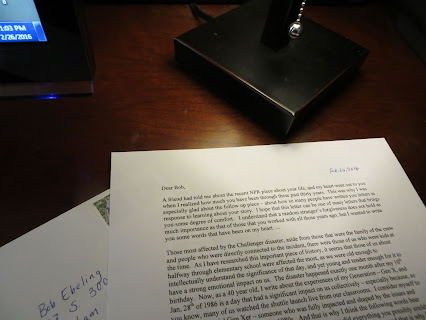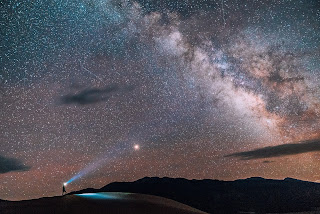 |
| photo credit: Alicia Petresc |
From 1970's Starry Skies to 1980's Launches
I lived not so far away from Utah in the late 1970's. My greatest joy was when my father would carry me on his back in our yard from where we would look up to the brilliant Albuquerque night sky. We were in a desert city yet to sprawl, there was still so little glow from the city lights, we could see what seemed like a million stars.
As the 1970's became the 1980's, the NASA shuttle era began and my love for the beauty of the universe grew. I was full of wonder when I heard the Reagan Administration had announced sending a teacher to space as part of the shuttle crew.
The Challenger launch was one of the most impactful experiences for the younger wave of Generation X, and for those of us in mid to late elementary school, we were old enough to grasp the significance of the day and still tender enough to be deeply wounded by it.
 |
| photo credit: NASA |
 |
| photo credit: NASA |
Hundreds of letters to Bob Ebeling
And all of this loss is why, even all of these years later, I needed there to be a hero somewhere in the bigger picture of this story - someone who tried to stop this day from happening. This is why I needed to know about Bob Ebeling. No one worked longer or harder at trying to stop the disaster than he did. He spent an entire year trying to convince the managers at NASA that it wouldn't be safe to launch. He didn't want to see people die or for school children to witness a tragedy. But the president wanted it, the pressure to launch was high given the repeated delays, and the warnings that Bob and other engineers gave about launching in such frigid temperatures were ignored. Bob even went so far as sending out a memo titled "HELP."
 |
String Theory and the Way our Lives are Tied Together
Physicists describe things at the most granular level, like atoms, with quantum mechanics, or things at the most macroscopic level, like stars, with general relativity -- but these groups usually work independently of each other. String theory is an attempt to reconcile these vastly different worlds, toward a solution that can provide a fuller understanding of our universe.
 |
| photo credit: javardh |
I could not understand the fuller story of how the Challenger disaster affected my life until I understood the way it had affected other people, like Bob and his daughter Leslie, who is now a very dear friend. She was there for him and with him the fateful day this all happened, and as she saw his struggle and his suffering, it brought them closer together. In gaining a better understanding of this, I was able to do the same with my own father more recently. We need each other's stories to understand our own. In taking a look at Bob Ebeling's journey and how he affected NASA, I was doing some reading on this, which, amazingly, led me to the work of my own father. While I knew my dad had worked as a NASA contractor in Houston many years after the disaster, focusing on safety certification, I thought it had more to do with on-the-ground operations. While I knew he had done some work involving the International Space Station, I had missed that he was doing so much for the safety of astronauts. It was the Ebeling family getting in touch with me that led me on a journey of understanding where my own family fit into this bigger picture.
 |
| photo credit: Josh Gordon |
I had never connected the dots on any of this until Leslie reached out to me. This was both astonishing and redemptive for me, as the Challenger disaster altered my childhood and overshadowed my outlook on life. It was where my distrust of institutions began, it was when my cynicism began. Five years ago, I had written a piece about how this affected my generation, not realizing my father had worked to make this right. Of all the ways I had wished my father could have been there for me, what I can hold onto is that he did this extraordinary thing for all of us who experienced the disaster that day. And because of this, the story, which is always so much larger than what we initially see, can end well. In writing the words, "I forgive you" to Bob, I was forgiving my own father at the same time.
Heavy Burdens and Heroism
We carry heavy burdens for decades, often those burdens aren't even our own - they are other people's selfishness and careless decisions. Bob carried the burden of others' choices on himself for 30 years. When I was a child, I thought that heroes were the people who showed up at just the right moment to do something amazing or to stop a catastrophic event from happening. Now I realize heroes are the people who do the right thing in the moment, who speak truth to power, and, regardless of the outcome, are still heroes. I now know they are the people who often carry the heaviest burdens of anyone.
 |
| photo credit: NASA |
Lunar Rocks and Stained Glass
We take January to look back on a crisis as we live through an era of enormous crises. A lunar rock brought back on Apollo 11 was gifted to the American National Cathedral and embedded in the stained glass. Today the cathedral's bells ring out in memory of Americans lost to the pandemic. Each peal honors a thousand lost lives. By the end of 2020, the daily death toll from Covid-19 was the equivalent of 16 fully loaded 737 jets falling out of the sky. As we start 2021, the numbers continue to rise. The dean of the cathedral reminds us that we are commanded to love one another, that we are not lone individuals free from responsibility - we are dependent upon one another for our very lives.
And then I noticed the reflection of the moon and stars in the water, so I took a picture of the candles from above. The candles glowed like planets reflecting the brightness of the sun.
Light from the other corner of the galaxy will travel for millennia before reaching our eyes. It can take us decades to see the bigger picture of our lives, the redemption, the part in the story where things start to get better. Astrophysics tells us that we are all made of the substance of stars. We can map those elements across the Milky Way. Maybe this means that sooner, if not later, we will all find our way back to love, our oneness with each other. In the wake of a supernova, there is this incredible brightness, not in spite of, but because of a cataclysmic explosion, and this is where new stars are formed. Light fills the universe. As the universe expands relentlessly, so does the human story, so does the light, so does the way each of our stories are connected to each other.
___________________________________
Afterward:
Bob was one of five engineers, including Roger Boisjoly, who warned of the impending disaster. Leslie carpooled with her father to work, and on January 28, 1986, as the disaster happened, she was right by his side. Leslie has done so much to honor her father's memory and integrity. When I asked her what she wants people know about Bob, she said she wants them to know that he was brilliant, and that he was a great father who provided well for his kids. She said that he gave them good childhoods full of opportunity and culture, sight-seeing, music lessons, hunting, fishing, skiing, and camping. She said he was very much involved in his kids' lives. |
| Bob with family, Leslie at his side - early 1960's |
 |
| Leslie (center) with Lesley Stahl (right) and her assistant (left) |
Thank you to my dad, Gary Craik, for all of your hard work on this at NASA.
And thank you to Leslie Ebeling Serna who became like a sister in the process of this extraordinary journey -- I only saw the bigger picture of this story because of you.
___________________________________
 |
| My dad and I when I was at the age when he would lift me up to see starry night skies. |
___________________________________________________
Sources
The Elegant Universe, Brian Greene
Cathedral.org press room - American Mourns 300,000
Space.com - Humans Really are Made of Stardust and a New Study Proves It
Articles by Howard Berkes:
NPR.org: 30 Years After Explosion, Challenger Engineer Still Blames Himself
NPR.org: Your Letters Helped Challenger Shuttle Engineer Shed 30 Years of Guilt
 |
| Weekly Reader - March 7, 1986 |
_____________________________
(c) 2021 by Chloe Koffas - all rights reserved
AP - picture from Weekly Reader above
NASA photos posted are public domain
Artistic photos by photographers on Unsplash.com, names credited in photo captions
Family photos posted with permission from the Ebeling family
additional photos my own






